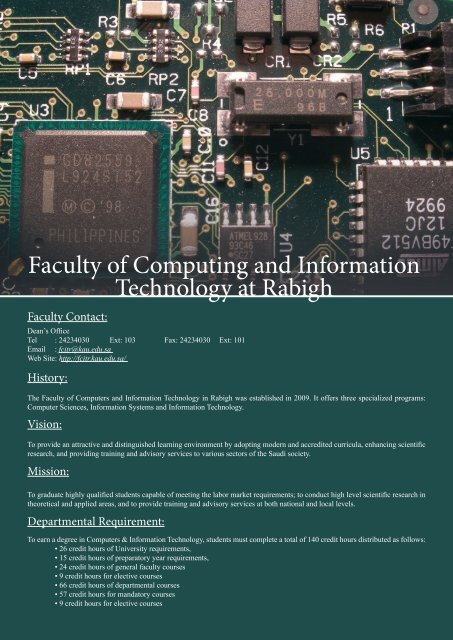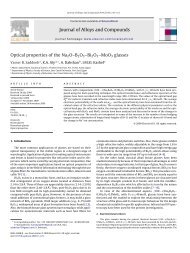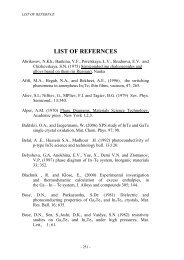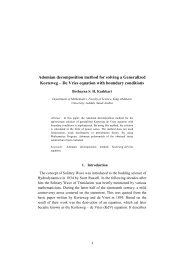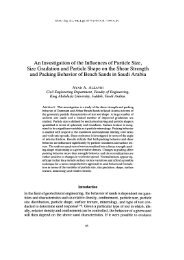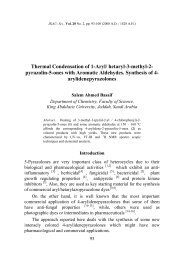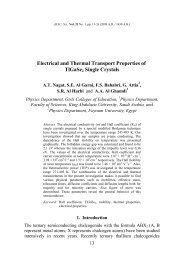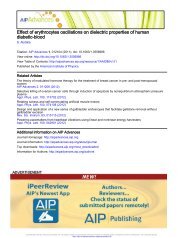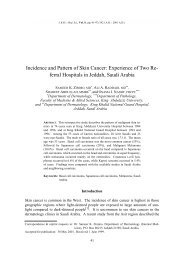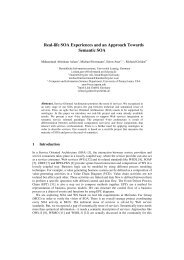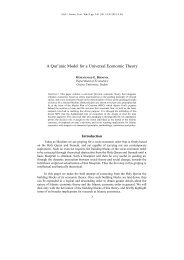Faculty of
Faculty of
Faculty of
Create successful ePaper yourself
Turn your PDF publications into a flip-book with our unique Google optimized e-Paper software.
<strong>Faculty</strong> <strong>of</strong> Computing and Information<br />
Technology at Rabigh<br />
<strong>Faculty</strong> Contact:<br />
Dean’s Office<br />
Tel : 24234030 Ext: 103 Fax: 24234030 Ext: 101<br />
Email : fcitr@kau.edu.sa<br />
Web Site: http://fcitr.kau.edu.sa/<br />
History:<br />
The <strong>Faculty</strong> <strong>of</strong> Computers and Information Technology in Rabigh was established in 2009. It <strong>of</strong>fers three specialized programs:<br />
Computer Sciences, Information Systems and Information Technology.<br />
Vision:<br />
To provide an attractive and distinguished learning environment by adopting modern and accredited curricula, enhancing scientific<br />
research, and providing training and advisory services to various sectors <strong>of</strong> the Saudi society.<br />
Mission:<br />
To graduate highly qualified students capable <strong>of</strong> meeting the labor market requirements; to conduct high level scientific research in<br />
theoretical and applied areas, and to provide training and advisory services at both national and local levels.<br />
Departmental Requirement:<br />
To earn a degree in Computers & Information Technology, students must complete a total <strong>of</strong> 140 credit hours distributed as follows:<br />
• 26 credit hours <strong>of</strong> University requirements,<br />
• 15 credit hours <strong>of</strong> preparatory year requirements,<br />
• 24 credit hours <strong>of</strong> general faculty courses<br />
• 9 credit hours for elective courses<br />
• 66 credit hours <strong>of</strong> departmental courses<br />
• 57 credit hours for mandatory courses<br />
• 9 credit hours for elective courses<br />
<strong>Faculty</strong> <strong>of</strong> Computing and<br />
Information Technology at Rabigh<br />
517<br />
18) Chapter Rabigh CIT.indd 517 8/21/10 12:18 PM
<strong>Faculty</strong> <strong>of</strong><br />
Computing and Information<br />
Technolgy at Rabigh<br />
<strong>Faculty</strong> Requirements: Students must complete the following 24 credit hours <strong>of</strong> general faculty courses: Credit Hours 24<br />
No.<br />
Course<br />
HOURS<br />
Course No. Course Title Credit<br />
Code:<br />
Theory Lab Prac<br />
Prerequisite<br />
1 STAT 210 Probability Theory 3 3 0 0 STAT 101<br />
2 CPIT 201 Introduction To Computing 3 3 1 0<br />
3 CPCS 202 Programming I 3 3 1 0<br />
4 CPCS 203 Programming II 3 3 1 0 CPCS 202<br />
5 CPCS 204 Data Structures I 3 3 1 0 CPCS 203<br />
6 CPIT 221 Technical Writing 2 1 2 0<br />
7 CPIS 334 Introduction To S<strong>of</strong>tware Project Management 2 2 1 0<br />
8 CPIS 428 Pr<strong>of</strong>essional Computing Issues 2 2 0 0<br />
CPCS 323, CPIS<br />
323, CPIT 323<br />
9 CPCS 222 Discrete Structures I 3 3 1 0<br />
Total 24 23 8 0<br />
Departments and Academic Degrees:<br />
Department / Program<br />
Information Technology<br />
Computer Sciences<br />
Information Systems<br />
Academic Degree<br />
B.Sc<br />
B.Sc<br />
B.Sc<br />
Course Descriptions:<br />
<strong>Faculty</strong> <strong>of</strong> Computing and<br />
Information Technology at Rabigh<br />
518<br />
CPIT 201 : Introduction to computing<br />
This course teaches the binary numeric systems and data representation.<br />
Topics include: the internal components <strong>of</strong> the computer<br />
and how they function, Basics <strong>of</strong> algorithms, programming<br />
and operating systems, basics <strong>of</strong> databases and networking.<br />
PCS 202 : Programming I<br />
The course aims at teaching students the principles and concepts<br />
<strong>of</strong> programming. How to write programs to solve simple problems.<br />
How to use programming to solve problems and scientific<br />
issues and process.<br />
CPCS 203: Programming II<br />
The course aims at teaching students the principles and concepts<br />
<strong>of</strong> object-oriented programming. How to use object-oriented<br />
programming to solve problems and scientific and practical issues<br />
in advanced applications.<br />
CPCS 204: Data Structures I<br />
The course aims to enable the student to understand in-depth<br />
data structures and to know how to apply them to resolve practical<br />
issues. It also aims at teaching students how to analyze algorithms<br />
performance.<br />
Prerequisites: CPCS 202<br />
CPIT 221: Technical Writing<br />
This course is designed to help students improve their writing<br />
skills and to learn strategies for successful writing both in college<br />
and pr<strong>of</strong>essional practice. It helps students to analyze essays<br />
as well as to write effective essays using strong, clear, effective<br />
sentences and well-developed paragraphs, and eliminating<br />
wordiness, weak expressions, and ambiguity.<br />
CPCS 222: Discrete Structure<br />
This course aims to give students the basic concepts <strong>of</strong> discrete<br />
mathematics that enables them to understand the necessary foundations<br />
for the study <strong>of</strong> computer systems and s<strong>of</strong>tware development<br />
CPIS 334: Introduction to S<strong>of</strong>tware Project Management<br />
The course aims to teach the students the basic concepts <strong>of</strong> IT<br />
project management in general, and programming systems projects<br />
in particular. He will know about the projects scheduling<br />
basics, build a working team, manage risks, solve the problems<br />
that may face the projects, implement the projects in time and<br />
within the allocated budgets. The student will also learn and use<br />
one <strong>of</strong> the most popular applications in programming systems<br />
projects management such as MS project management to practice<br />
what he learned.<br />
CPIS 428: Pr<strong>of</strong>essional Computing Issues<br />
The course aims to give a full description <strong>of</strong> the ethical, legal,<br />
cultural and pr<strong>of</strong>essional issues related to the age <strong>of</strong> computers<br />
and information.<br />
Prerequisites:<br />
CPIT 323 or CPCS 323 or<br />
CPIS 323<br />
18) Chapter Rabigh CIT.indd 518 8/21/10 12:18 PM
Department <strong>of</strong><br />
Computer Science<br />
Department Contact:<br />
Chairman’s Office<br />
Tel : 024234030 Ext: 103 Fax: 024234030 Ext: 101<br />
Email : fcitr@kau.edu.sa<br />
Web Site: http://fcitr.kau.edu.sa<br />
History:<br />
The department was established in 2009 and was activated in the second semester <strong>of</strong> the academic year 2008 - 2010.<br />
Vision:<br />
To be a distinct department in the field <strong>of</strong> education and scientific research and contribute to the Saudi community by providing<br />
training and advisory services.<br />
Mission:<br />
To provide advanced and distinguished educational curricula, and to graduate highly qualified students that are able to serve their<br />
country, perform high-level scientific research and provide training and advisory services to serve the community.<br />
Departmental Requirements:<br />
To earn a degree in Computers & Information Technology, students must complete a total <strong>of</strong>140 credit hours distributed as follows:<br />
• 26 credit hours <strong>of</strong> University requirements,<br />
• 15 credit hours <strong>of</strong> Foundation year requirements,<br />
• 24 credit hours <strong>of</strong> general faculty courses<br />
• 9 credit hours for elective courses<br />
• 66 credit hours <strong>of</strong> departmental courses<br />
• 57 credit hours for mandatory courses<br />
• 9 credit hours for elective courses<br />
Department Study Plan:<br />
Students study 66 credit hours <strong>of</strong> courses according to specialization.<br />
Study Requirements Plan for Department <strong>of</strong> DEPARTMENT OF COMPUTERS SCIENCES Track - A:<br />
Department Core Courses: Credit Hours 57<br />
No.<br />
Course<br />
HOURS<br />
Course No. Course Title Credit<br />
Code:<br />
Theory Lab Prac<br />
Prerequisite<br />
1 Lab Science 2 4 3 3 0<br />
2 CPCS 211 Digital Logic Design 3 3 1 0 CPIT 201<br />
3 CPCS 212 Applied Math for Computing 1 4 3 2 0 MATH 202<br />
4 CPCS 214 Computer Organization & Architecture 1 3 3 1 0 CPCS 211<br />
5 CPCS 223 Analysis & Design <strong>of</strong> Algorithms 3 3 1 0 CPCS 204<br />
6 CPCS 241 Database 1 3 3 1 0 CPCS 204<br />
7 CPCS 301 Programming Languages 3 3 1 0 CPCS 204, 222<br />
8 CPCS 302 Compiler Construction 3 3 1 0 CPCS 301<br />
9 CPCS 323 Summer(workplace) Training I 0 0 0 3<br />
10 CPCS 324 Algorithms & Data Structures 2 3 3 1 0 CPCS 222 - 223<br />
11 CPCS 331 Artificial Intelligence 1 3 3 1 0 CPCS204, 223<br />
12 CPCS 351 S<strong>of</strong>tware Engineering 1 3 3 1 0 CPCS 204<br />
13 CPCS 361 Operating Systems 1 3 3 1 0 CPCS 204, 214<br />
14 CPCS 371 Computer Networks 1 3 3 1 0 CPCS 214<br />
15 CPCS 381 Human-Computer Interaction 1 2 2 1 0 CPCS 204<br />
16 CPCS 391 Computer Graphics 1 3 3 1 0 CPCS 204, 212<br />
17 CPCS 498 Senior Project 1 1 1 0 0 Senior Level<br />
18 CPCS 499 Senior Project 2 3 2 2 0 CPCS 498<br />
19 MATH 202 Calculus 2 4 4 0 0 MATH 101<br />
20 STAT 352 Applied Probability & Random Processes 3 3 1 0 STAT 210<br />
Total 57 54 21 0<br />
<strong>Faculty</strong> <strong>of</strong> Computing and<br />
Information Technology at Rabigh<br />
519<br />
18) Chapter Rabigh CIT.indd 519 8/21/10 12:18 PM
Department <strong>of</strong><br />
Computer Science<br />
Elective Core Courses: Credit hours 9 Students select 9 credit hours from the following elective courses<br />
No.<br />
Course<br />
HOURS<br />
Course No. Course Title Credit<br />
Code:<br />
Theory Lab Prac<br />
Prerequisite<br />
1 CPCS 353 S<strong>of</strong>tware Eng. Practices 3 3 1 0 CPCS 351<br />
2 CPCS 372 Computer Networks 2 3 3 1 0 CPCS 371<br />
3 CPCS 403 Internet Application Programming 3 3 0 0 CPCS 324, 371<br />
4 CPCS 404 Component-Based Computing 3 3 0 0 CPCS 351<br />
5 CPCS 405 S<strong>of</strong>tware Technology Topics 3 3 0 0 CPCS 351<br />
6 CPCS 413 Computer Architecture 2 3 3 0 0 CPCS 341<br />
7 CPCS 414 High Performance Computing 3 3 0 0 CPCS 361<br />
8 CPCS 424 Theory Of Computation 3 3 0 0 CPCS 212, 222<br />
9 CPCS 425 Information Security 3 3 0 0 CPCS 361, 371<br />
10 CPCS 432 Artificial Intelligence 2 3 3 0 0 CPCS 331<br />
11 CPCS 433 Artificial Intelligence Topics 3 3 0 0 CPCS 331<br />
12 CPCS 442 Database 2 3 3 0 0 CPCS 241<br />
13 CPCS 454 Object-Oriented Analysis & Design 3 3 0 0 CPCS 351<br />
14 CPCS 457 S<strong>of</strong>tware Engineering 3 3 0 0 CPCS 351<br />
15 CPCS 462 Operating Systems 2 3 3 0 0 CPCS 361<br />
16 CPCS 463 Computing Systems Security 3 3 0 0 CPCS 361, 371<br />
17 CPCS 464 Dependable Computing 3 3 0 0 CPCS 463<br />
18 CPCS 465<br />
Performance and Modeling <strong>of</strong> Computing<br />
Systems<br />
3 3 0 0 CPCS 361, 324<br />
19 CPCS 466 Systems Programming 3 3 0 0 CPCS 361<br />
20 CPCS 473 Computer Networks Practice 3 3 0 0 CPCS 371<br />
21 CPCS 474 TCP/IP & Web 3 3 0 0 CPCS 371<br />
22 CPCS 482 Multimedia & User Interface Design 3 3 0 0 CPCS 381<br />
23 CPCS 494 Special/Selected Topics 3 3 0 0<br />
Total 69 69 2 0<br />
<strong>Faculty</strong> <strong>of</strong> Computing and<br />
Information Technology at Rabigh<br />
Course Descriptions:<br />
CPCS 202: Programming I<br />
The course aims at teaching students the principles and concepts<br />
<strong>of</strong> programming. How to write programs to solve simple problems.<br />
How to use programming to solve problems and scientific<br />
issues and process.<br />
CPCS 203: Programming II<br />
The course aims at teaching students the principles and concepts<br />
<strong>of</strong> object-oriented programming. How to use object-oriented programming<br />
to solve problems and scientific and practical issues in<br />
advanced applications.<br />
Prerequisites: CPCS 202<br />
CPCS 204: Data Structures I<br />
The course aims to enable the student to understand in-depth data<br />
structures and to know how to apply them to resolve practical issues.<br />
It also aims at teaching students how to analyze algorithms<br />
performance.<br />
Prerequisites: CPCS 203<br />
STAT 210 - Probability Theory<br />
The course aims to introduce students to concepts <strong>of</strong> probability<br />
theory and how to use them in decision-making with the study <strong>of</strong><br />
random variables and probability distributions and their charac-<br />
teristics, as well as the study <strong>of</strong> simulation techniques and training<br />
the student on the use <strong>of</strong> statistical s<strong>of</strong>tware packages.<br />
Prerequisites: STAT 101<br />
CPCS 214: Computer Organization and Architecture 1<br />
This course aims to give the student a solid background in the<br />
basics <strong>of</strong> contemporary computers. In particular, the computer science’s<br />
student must understand the interactions between his programs<br />
and the machine.<br />
Prerequisites: CPCS 211<br />
CPCS 222: Discrete Structures I<br />
This course aims to give students the basic concepts <strong>of</strong> discrete<br />
mathematics that enables them to understand the necessary foundations<br />
for the study <strong>of</strong> computer systems and s<strong>of</strong>tware development.<br />
CPCS 223: Analysis and Design <strong>of</strong> Algorithms<br />
This course aims to teach the student how to find solutions using<br />
algorithms The focus will be on the different methods to analyze<br />
algorithms and design solutions.<br />
Prerequisites: CPCS 204<br />
CPCS 241: Database 1<br />
This course aims to give students an introduction to the basic concepts<br />
<strong>of</strong> data modeling and database design principles. This course fo-<br />
520<br />
18) Chapter Rabigh CIT.indd 520 8/21/10 12:18 PM
Department <strong>of</strong><br />
Computer Science<br />
cuses on concepts and methods <strong>of</strong> building relational models and OO<br />
relational models. It also focuses on understanding database models<br />
and matching the data with these models. The course covers also the<br />
basic rules for the Structured Query Language.<br />
Prerequisites: CPCS 204<br />
CPCS 301: Programming Languages<br />
This course aims to introduce the student to different programming<br />
languages in addition to brief him on a comparative study<br />
<strong>of</strong> them that takes into account the philosophical aspect <strong>of</strong> the<br />
language characteristics, the design, the structural structures and<br />
others. It also focuses on the ideas that are not available in traditional<br />
languages.<br />
Prerequisites: CPCS 204, CPCS 222<br />
CPCS 351 - ِS<strong>of</strong>tware Engineering 1<br />
This course aims to teach students the basic concepts and the required<br />
skills for s<strong>of</strong>tware engineering. It covers the concepts and needed<br />
skills to build applications. The course displays the latest methods,<br />
skills and techniques used in s<strong>of</strong>tware engineering, derived from actual<br />
practice. The course focuses in particular on collective action in<br />
building s<strong>of</strong>tware and skills to work as part <strong>of</strong> a team.<br />
Prerequisites: CPCS 204<br />
CPCS 324 - ِAlgorithms and Data Structures 2<br />
This is the second course on the subject <strong>of</strong> algorithms and data structures.<br />
It aims to introduce the student and deepening the concepts<br />
for the students <strong>of</strong> the specialization through the study <strong>of</strong> some advanced<br />
structural compositions, such as the balanced tree and topics<br />
related to algorithms such as their degree <strong>of</strong> complexity.<br />
Prerequisites: CPCS 222, CPCS 223<br />
CPCS 331: Artificial Intelligence 1<br />
This course aims to introduce students to topics related to artificial<br />
intelligence. It presents also systems that show some sort <strong>of</strong> intelligent<br />
behaviors such as vision and elicitation. A programming<br />
language related to the course is taught.<br />
Prerequisites: CPCS 204, CPCS 223<br />
CPCS 381: Human-Computer Interaction 1<br />
This course aims to introduce students to the basics <strong>of</strong> the interaction<br />
between computer and human through the study <strong>of</strong> topics<br />
related to the course.<br />
Prerequisites: CPCS 204<br />
CPCS 391: Computer Graphics 1<br />
This course aims to introduce students to topics related to computer<br />
graphics such as its basics and the techniques used. The student<br />
performs many <strong>of</strong> the applications that show the student’s<br />
understanding <strong>of</strong> the course subjects.<br />
Prerequisites: CPCS 204, CPCS 212<br />
CPCS 361 – ِOperating Systems 1<br />
This course aims to introduce students to the basic concepts, structures<br />
and algorithms that work as intermediary s<strong>of</strong>tware between<br />
the user and the hardware or the so-called operating systems.<br />
It covers the basic concepts <strong>of</strong> modern operating systems, their<br />
methods <strong>of</strong> design and the comparison <strong>of</strong> their methods <strong>of</strong> work<br />
in terms <strong>of</strong> efficiency and reliability. The course compares also the<br />
algorithms used in building operating systems in terms <strong>of</strong> speed<br />
and the use <strong>of</strong> space.<br />
Prerequisites: CPCS 214, CPCS 204<br />
CPCS 371 – Computer Networks 1<br />
This course aims to acquaint students with topics covering areas<br />
ranging from the transfer <strong>of</strong> data to the application s<strong>of</strong>tware for<br />
computer networks.<br />
Prerequisites: CPCS 214<br />
CPCS 353 – S<strong>of</strong>tware Eng. Practices<br />
This course aims to give students an idea <strong>of</strong> how to implement<br />
s<strong>of</strong>tware engineering projects and this include practical elements<br />
in a large and specialized way.<br />
Prerequisites: CPCS 351<br />
CPCS 372 – Computer Networks 2<br />
This course aims to introduce students to techniques and advanced<br />
topics in systems and networking technology as well as the successive<br />
developments in this area.<br />
Prerequisites: CPCS 371<br />
CPCS 212 – Applied Math for Computing 1<br />
The course aims to introduce students to the basic concepts <strong>of</strong> applied<br />
mathematics used in computer science by identifying partial<br />
differentiation, multiple integrals, Applied Linear Algebra and by<br />
training the student to use s<strong>of</strong>tware packages and write programs<br />
related to the previous applications.<br />
Prerequisites: MATH 202<br />
STAT 352 – Applied Probability and Random Processes<br />
This applied course aims to introduce students to the basic concepts<br />
<strong>of</strong> applied probability and random processing with a focus<br />
on computer applications. The course aims to enable the student<br />
to perform a standard analysis and study <strong>of</strong> computer systems’<br />
effectiveness and performance.<br />
Prerequisites: STAT 210<br />
CPCS 403 – Internet Application Programming<br />
This course aims to introduce students to the basics <strong>of</strong> s<strong>of</strong>tware<br />
applications relevant to the Internet.<br />
Prerequisites: CPCS 371, CPCS 324<br />
CPCS 404 – Component-Based Computing<br />
This course aims to introduce students to programming based on<br />
s<strong>of</strong>tware components and how to deal with it.<br />
Prerequisites: CPCS 351<br />
CPCS 405 – S<strong>of</strong>tware Technology Topics<br />
This course aims to introduce students to modern topic related to<br />
s<strong>of</strong>tware technology.<br />
Prerequisites: CPCS 351<br />
CPCS 412 – Computer Architecture 2<br />
This course aims to introduce students to methods <strong>of</strong> modern<br />
computer architecture such as the advanced code design and the<br />
cascading flow system - advanced methods in data processing.<br />
Prerequisites: CPCS 341<br />
CPCS 414 – High Performance Computing<br />
This course aims to introduce students to the basic idea for high-<br />
<strong>Faculty</strong> <strong>of</strong> Computing and<br />
Information Technology at Rabigh<br />
521<br />
18) Chapter Rabigh CIT.indd 521 8/21/10 12:18 PM
Department <strong>of</strong><br />
Computer Science<br />
<strong>Faculty</strong> <strong>of</strong> Computing and<br />
Information Technology at Rabigh<br />
522<br />
performance computers as well as knowledge <strong>of</strong> the structure details<br />
<strong>of</strong> high performance systems.<br />
Prerequisites: CPCS 361<br />
CPCS 424 – Theory <strong>of</strong> Computation<br />
This course aims to introduce students to the idea <strong>of</strong> the computers<br />
theory, as well as an introduction to the idea <strong>of</strong> the mechanism, the<br />
language, the rules and all their types.<br />
Prerequisites: CPCS 212, CPCS 222<br />
CPCS 425 – Information Security<br />
This course aims students to the basics <strong>of</strong> information security and<br />
related topics.<br />
Prerequisites: CPCS 361, CPCS 371<br />
CPCS 432 – Artificial Intelligence 2<br />
This course aims to introduce students to advanced topics related<br />
to artificial intelligence, and complete the already learned programming<br />
language related to the course.<br />
Prerequisites: CPCS 331<br />
CPCS 433 – Artificial Intelligence Topics<br />
This course aims to introduce students to modern topics to inform<br />
them on the latest updates in this area.<br />
Prerequisites: CPCS 331<br />
CPCS 442 – Database 2<br />
This course aims to introduce students to advance topics in databases.<br />
Prerequisites: CPCS 241<br />
CPCS 457 – S<strong>of</strong>tware Engineering Theory<br />
This course aims to introduce students to the importance <strong>of</strong> s<strong>of</strong>tware<br />
engineering, particularly with regard to s<strong>of</strong>tware engineering<br />
projects in the light <strong>of</strong> modern theories in this area.<br />
Prerequisites: CPCS 351<br />
CPCS 454 – Object-Oriented Analysis and Design<br />
This course aims to introduce students to the objec-oriented essence<br />
in systems and the derived benefits from using this approach.<br />
Prerequisites: CPCS 351<br />
CPCS 462 – Operating Systems 2<br />
This course aims to introduce students to some <strong>of</strong> the modern alternatives<br />
to processes and operating models such as distributed<br />
and parallel processes - real-time processes.<br />
Prerequisites: CPCS 361<br />
CPCS 463 – Computing Systems Security<br />
This course aims to introduce students to the basics <strong>of</strong> the computer<br />
systems security and the risks that the system faces.<br />
Prerequisites: CPCS 361, CPCS 371<br />
CPCS 464 – Dependable Computing<br />
This course aims to acquaint students with high reliability systems<br />
used in critical applications that do not bear the errors or<br />
the system’s collapse.<br />
Prerequisites: CPCS 463<br />
CPCS 465 – Performance and Modeling <strong>of</strong> Comp. System.<br />
This course aims to introduce students to the basics <strong>of</strong> methods<br />
to performance measuring and computer systems modeling,<br />
which is considered as an important basis for the majority <strong>of</strong><br />
Computer Science.<br />
Prerequisites: CPCS 324, CPCS 361<br />
CPCS 466 – Systems Programming<br />
This course aims to introduce students to how to design, operate<br />
and develop s<strong>of</strong>tware systems.<br />
Prerequisites: CPCS 361<br />
CPCS 473 – Computer Network Practice<br />
This course aims to introduce students to topics related to the<br />
practical bases <strong>of</strong> computer networks, giving the student the possibility<br />
<strong>of</strong> understanding the networks components.<br />
Prerequisites: CPCS 371<br />
CPCS 474 – TCP/IP and Web Networking<br />
This course aims to introduce students to the basics <strong>of</strong> TCP / IP<br />
networks and the Web so that the student will be a specialist in<br />
the TCP / IP networks protocols and the Web after studying this<br />
course.<br />
Prerequisites: CPCS 371<br />
CPCS 482 – Multimedia and User Interface Design<br />
This course aims to introduce students to ideas on multimedia<br />
and use them in the design <strong>of</strong> interaction interfaces between the<br />
computer and the user.<br />
Prerequisites: CPCS 381<br />
CPCS 494 – Special Selected Topics<br />
This course gives the student a way to select topics that are not<br />
included in the previous courses, already studied, especially new<br />
and emerging topics in computer science.<br />
CPCS 498 – Graduation Project-1<br />
This course aims to give students opportunities to demonstrate<br />
the skills they gained during their study <strong>of</strong> the curriculum courses,<br />
and then show these skills through the submission <strong>of</strong> a proposal<br />
for the graduation project. A link should be done between<br />
this course and the selected topics where the student chooses the<br />
graduation project according to the selected topics content.<br />
Prerequisites:<br />
Graduation Year<br />
CPCS 499 – Graduation Project-2<br />
This course aims at implementing what has been proposed in the<br />
previous course. The students are required to submit a report and<br />
presentation <strong>of</strong> the graduation project.<br />
Prerequisites: CPCS 498<br />
18) Chapter Rabigh CIT.indd 522 8/21/10 12:18 PM
Department <strong>of</strong><br />
Information Systems<br />
Department Contact:<br />
Chairman’s Office<br />
Tel : 024234030 Ext:103 Fax: 024234030 Ext: 101<br />
Email : fcitr@kau.edu.sa<br />
Web Site: http://fcitr.kau.edu.sa/<br />
History:<br />
The IS department was established in 2009 and was activated in the second semester <strong>of</strong> the academic year 2009-2010.<br />
Vision:<br />
To be a distinct department in the field <strong>of</strong> Information Sciences, conducting quality scientific research and contributing the Saudi<br />
community by providing training and advisory services.<br />
Mission:<br />
To provide advanced and distinguished curricula that will produce highly qualified students capable <strong>of</strong> serving their country, conducting<br />
high-level scientific research and providing training and advisory services to serve the community.<br />
Department Requirement:<br />
To earn a degree in Computers & Information Technology, students must complete a total <strong>of</strong>140 credit hours distributed as follows:<br />
• 26 credit hours <strong>of</strong> University requirements,<br />
• 15 credit hours <strong>of</strong> preparatory year requirements,<br />
• 24 credit hours <strong>of</strong> general faculty courses<br />
• 9 credit hours for elective courses<br />
• 66 credit hours <strong>of</strong> departmental courses<br />
• 57 credit hours for mandatory courses<br />
• 9 credit hours for elective courses<br />
Students must complete 66 credit hours <strong>of</strong> core departmental courses according to specialization. Department Core Courses Credit Hours 57<br />
No.<br />
Course<br />
HOURS<br />
Course No. Course Title Credit<br />
Code:<br />
Theory Lab Prac<br />
Prerequisite<br />
1 BUS 230 Introduction to Modern Management 2 2 0 0<br />
2 BUS 232 Modern Business Models 2 2 0 0 BUS 230<br />
3 BUS 233 Organizational Behavior 2 2 0 0 BUS 230<br />
4 ACCT 333 Principles <strong>of</strong> Corporate Accounting 2 2 0 1 BUS 230<br />
5 CPIS 210 Computer Architecture & Organization 3 3 1 1 CPCS 202<br />
6 CPIS 220 Principles <strong>of</strong> Information Systems 3 3 1 1 CPCS 202<br />
7 CPIS 222 Principles <strong>of</strong> Operating Systems 3 3 1 1 CPIS 210<br />
8 CPIS 240 Database Management Systems I 3 3 1 1 CPCS 204<br />
9 CPIS 250 S<strong>of</strong>tware Engineering 3 3 1 1 CPCS 204<br />
10 CPIS 312 Information & Computer Security 3 3 1 1 CPIS 370<br />
11 CPIS 323 Summer(workplace) Training I 0 0 0 3<br />
12 CPIS 342 Data Warehousing and Mining 3 3 1 1 CPIS 240<br />
13 CPIS 351 IS Analysis & Architecture Design 3 3 0 2 CPIS 250, BUS 232<br />
14 CPIS 352 IS Applications Design & Development 3 3 0 2 CPIS 351<br />
15 CPIS 354 Principles <strong>of</strong> Human Computer Interaction 3 3 1 1 CPIS 250<br />
16 CPIS 357 S<strong>of</strong>tware Quality and Testing 3 3 0 1 CPIS 250, CPIS 334<br />
17 CPIS 358 Internet Applications & Web Programming 3 3 1 2 CPIS 250<br />
18 CPIS 370 Fundamentals <strong>of</strong> Data Networks 3 3 1 1 CPIS 222<br />
19 CPIS 380 Introduction to E-Business Systems 3 3 1 1 CPIS 351, CPIS 358<br />
20 CPIS 434 IS Strategies and Policies 3 3 0 1 CPIS 220<br />
21 CPIS 498 Senior Project 1 1 1 0 0 Senior Level<br />
22 CPIS 499 Senior Project 2 3 2 2 0 CPIS 498<br />
Total 57 56 13 22<br />
<strong>Faculty</strong> <strong>of</strong> Computing and<br />
Information Technology at Rabigh<br />
523<br />
18) Chapter Rabigh CIT.indd 523 8/21/10 12:18 PM
Department <strong>of</strong><br />
Information Systems<br />
Elective Courses: Credit Hours 9 Students must select 9 credit hours from the following elective courses.<br />
No.<br />
Course<br />
HOURS<br />
Course No. Course Title Credit<br />
Code:<br />
Theory Lab Prac<br />
Prerequisite<br />
1 STAT 217 Introduction to Quantitative Analysis 3 3 1 0 STAT 210<br />
2 ACCP 334 Business Analysis 3 3 1 0 BUS 232<br />
3 STAT 260 Operations Research 3 3 1 0 STAT 210<br />
4 CPIS 320 Decision Support Systems & Theory 3 3 1 2 CPIS 220<br />
5 CPIS 330 Advanced Project & Quality Management 3 3 1 1 CPIS 334, CPIS 357<br />
6 CPIS 340 Database Management Systems II 3 3 1 0 CPIS 240<br />
7 CPIS 350 Systems Design Patterns 3 3 1 0 CPIS 250<br />
8 CPIS 356 SW Metrics and Economics 3 3 1 0 CPIS 250<br />
9 CPIS 360 Advanced Information Systems Technologies 3 3 2 1 CPIS 240<br />
10 CPIS 363 Intelligent Systems 3 3 1 0 CPIS 250<br />
11 CPIS 382 Development <strong>of</strong> E-Systems & Interface Design 3 3 2 1 CPIS 350,351,354<br />
12 CPIS 420 Techniques <strong>of</strong> Decision Support Systems 3 3 1 2 CPIS 320<br />
13 CPIS 424 Modeling & Simulations 3 3 1 2 CPIS 250<br />
14 CPIS 430 IS Change Management 3 3 0 1 CPIS 330<br />
15 CPIS 444 Knowledge Management 3 3 1 0 CPIS 240<br />
16 CPIS 461 Business Information Systems 3 3 1 1 CPIS 360<br />
17 CPIS 462 Information Systems Applications 3 3 1 1 CPIS 461<br />
18 CPIS 464 Distributed Systems 3 3 0 2 CPIS 370<br />
19 CPIS 465 Geographical Information Systems 3 3 1 0 CPIS 220<br />
20 CPIS 466 Office Automation Systems 3 3 1 0 BUS 232, CPIS 351<br />
21 CPIS 472 Data Networks Design and Management 3 3 1 0 CPIS 370<br />
22 CPIS 483 E-Systems Applications 3 3 1 1 CPIS 382<br />
23 CPIS 486 E-Business Strategies 3 3 0 1 BUS 232, CPIS 483<br />
24 CPIS 490 Selected Topics in IS 3 3 1 0 Department. Approval<br />
Total 72 72 23 16<br />
<strong>Faculty</strong> <strong>of</strong> Computing and<br />
Information Technology at Rabigh<br />
524<br />
Course Descriptions:<br />
CPIS 210: Computer Architecture and Organization<br />
This course aims to introduce students to the internal construction<br />
<strong>of</strong> computers. It defines and introduces the key internal parts<br />
that make up the computer and how to link them in terms <strong>of</strong><br />
compatibility and control. Topics also include an introduction to<br />
logic and digital design.<br />
Prerequisites: CPCS 202<br />
CPIS 220: Principles <strong>of</strong> Information Systems<br />
This course aims to give students an introduction to the basic<br />
concepts <strong>of</strong> information systems within the commercial and administrative<br />
frameworks. It describes and covers the basic concepts<br />
<strong>of</strong> design, construction and use <strong>of</strong> information systems.<br />
Topics include: s<strong>of</strong>tware and hardware components <strong>of</strong> information<br />
systems, basics <strong>of</strong> the decision-making theory and its methods.<br />
Prerequisites: CPCS 202<br />
CPIS 222: Principles <strong>of</strong> Operating Systems<br />
This course presents the basic concepts, structures and algorithms<br />
that work as intermediary programs between the user and<br />
the hardware, known as operating systems. It covers the basic<br />
concepts <strong>of</strong> modern operating systems, how they are designed<br />
and compares between their efficiency and reliability.<br />
Prerequisites: CPCS 204, CPIS 210<br />
CPIS 240: Database Management Systems I<br />
This course gives an introduction to the concepts <strong>of</strong> data modeling<br />
and database design principles. It focuses on the methods<br />
<strong>of</strong> building models and the entities relationships, the databases<br />
decision models and data matching, and the basic rules <strong>of</strong> structural<br />
query language.<br />
Prerequisites: CPCS 204<br />
CPIS 250: S<strong>of</strong>tware Engineering<br />
This course aims to teach students the basic concepts and the required<br />
skills for s<strong>of</strong>tware engineering. It covers the concepts and<br />
skills that are required to build large-scale applications which<br />
require long periods <strong>of</strong> time. The course presents the latest skills<br />
and techniques used in s<strong>of</strong>tware engineering, derived from the<br />
actual practice <strong>of</strong> the field as well as the latest results <strong>of</strong> the<br />
specialized research centers, focusing in particular on collective<br />
action in building s<strong>of</strong>tware and team-work skills.<br />
Prerequisites: CPCS 204<br />
CPIS 312: Information and Computer Security<br />
This course aims to equip students with scientific and mathematical<br />
concepts, and various skills related to information security.<br />
It covers the subject <strong>of</strong> information and s<strong>of</strong>tware systems security<br />
from multiple aspects, including penetration and encryption,<br />
mathematical foundations <strong>of</strong> cryptography and its algorithms,<br />
and keys distribution methods. It also deals with data security<br />
mechanisms in computer networks and secure access methods<br />
using passwords.<br />
Prerequisites: CPIS 370<br />
18) Chapter Rabigh CIT.indd 524 8/21/10 12:18 PM
Department <strong>of</strong><br />
Information Systems<br />
CPIS 323: Summer (workplace) Training I<br />
This course introduces students to real work environments related<br />
to their specialization and provides them with the opportunity<br />
to work on actual and practical problems in the field <strong>of</strong><br />
computing. Students should submit a written report about their<br />
experience in the workplace. Evaluation will be done jointly by<br />
a faculty member and a workplace supervisor.<br />
CPIS 342: Data Warehousing and Mining<br />
This course aims to equip students with the basic concepts and<br />
skills necessary to build and use data warehouses. The course<br />
focuses on how to use data warehouses to support decision-making<br />
process, data warehousing structure and the necessary infrastructure<br />
to build these warehouses. It also explains the various<br />
ways and methods <strong>of</strong> extracting and analyzing data to support<br />
the decision-making process.<br />
Prerequisites: CPIS 204<br />
CPIS 351: IS Analysis and Architecture Design<br />
The course aims to introduce students to the methods used in<br />
the analysis <strong>of</strong> information systems, and ways <strong>of</strong> identifying<br />
and describing their needs in order to automate and establish<br />
its computer systems. The course covers several automated system<br />
techniques; object-oriented analysis, design techniques, and<br />
structured analysis methods.<br />
Prerequisites: CPIS 250, BUS 232<br />
CPIS 352: IS Applications Design and Development<br />
This course focuses on how to build and maintain applications<br />
systems using user interfaces systems. It presents ways <strong>of</strong> developing<br />
s<strong>of</strong>tware and needed databases to cover the necessary<br />
basics needed by the labor market.<br />
Prerequisites: CPIS 351<br />
CPIS 354: Principles <strong>of</strong> Human Computer Interaction<br />
This course is an introduction to scientific and applied concepts <strong>of</strong> the<br />
communication basics between man and computer. It focuses on the<br />
engineering and programming foundations to build various kinds <strong>of</strong><br />
applications interfaces, and explains the concepts related to the methods<br />
<strong>of</strong> selection and comparison <strong>of</strong> graphical units in terms <strong>of</strong> functions<br />
and ease <strong>of</strong> use, and links between applications interfaces design<br />
and how the human mind works.<br />
Prerequisites: CPIS 250<br />
CPIS 357: S<strong>of</strong>tware Quality and Testing<br />
This course aims to emphasize the importance <strong>of</strong> quality in the production<br />
and development <strong>of</strong> information and to confirm the basic<br />
concepts <strong>of</strong> program quality at all stages <strong>of</strong> the development process<br />
starting from the planning and analysis stage to the design, programming,<br />
installation, testing and maintenance phases. The course reviews<br />
quality systems standards in the s<strong>of</strong>tware industry and information<br />
systems such as: CMM & IEEE to ensure that the standard<br />
metrics are used in the s<strong>of</strong>tware production process itself, while ensuring<br />
its continued evolution.<br />
Prerequisites: CPIS 250, CPIS 334<br />
CPIS 358: Internet Applications and Web Programming<br />
This course aims to equip students with the necessary knowledge to<br />
design and implement s<strong>of</strong>tware that works on the internet. It focuses<br />
on the techniques that are specifically used for internet s<strong>of</strong>tware and<br />
how to employ them in order to achieve high performance and efficiency.<br />
The basic aim is to introduce the technical characteristics <strong>of</strong><br />
the various protocols that are Internet-related, and the various structures<br />
to build applications on the Internet and methods to organize<br />
and secure business operations on the networks.<br />
Prerequisites: CPIS 250<br />
CPIS 370: Fundamentals <strong>of</strong> Data Networks<br />
This course covers the basic theoretical concepts and technical<br />
aspects <strong>of</strong> data networks. It includes data transfer topics ranging<br />
from the lower levels related to the hardware and internetworking,<br />
up to the higher levels <strong>of</strong> data transfer and application protocols.<br />
The course deals also with the scientific theories which<br />
constitute the basics <strong>of</strong> modern digital communication technology.<br />
Prerequisites: CPIS 222<br />
CPIS 380: Introduction to E-Business Systems<br />
This course aims to equip students with the basic concepts and<br />
skills needed to build e-business applications. It focuses on the<br />
transfer <strong>of</strong> institutions from traditional work to electronic work.<br />
It explains the fundamental differences between doing business<br />
through traditional and electronic methods and how to transform<br />
traditional methods to modern methods using new models in<br />
building e-business.<br />
Prerequisites: CPIS 351, CPIS 358<br />
CPIS 434: IS Strategies and Policies<br />
This course aims to define the strategic framework concept that<br />
permits the evaluation and use <strong>of</strong> modern technology in order to<br />
serve the general goals <strong>of</strong> the institution. It deals with the three<br />
strategic planning nooks, their relationships and their mutual effects,<br />
and explains the strategies fundamental to administrate<br />
and use the information technology and how to put long and<br />
short term plans in order to get technology and administrate it.<br />
Prerequisites: CPIS 220<br />
CPIS 498: Senior Project-1<br />
The course is designed to give final year students the chance to<br />
integrate all the knowledge acquired during their studies and to<br />
demonstrate this through the submission and presentation <strong>of</strong> a<br />
proposal and a project report. Students should choose a graduation<br />
project subject related to the ideas presented in the Selected<br />
Topics course.<br />
Prerequisites:<br />
Senior Level<br />
CPIS 499: Senior Project-2<br />
The course is designed to fulfill the plan approved in CPIS 498.<br />
Students should submit a written report and an oral presentation<br />
<strong>of</strong> their graduation project.<br />
Prerequisites: CPIS 498<br />
CPIS 320: Decision Support Systems and Theory<br />
This course aims to provide students with the required skills and<br />
knowledge <strong>of</strong> the different models and methods used in decision<br />
analysis in order to make logical decisions that are based on<br />
mathematical concepts in cases <strong>of</strong> uncertainty and lack <strong>of</strong> infor-<br />
<strong>Faculty</strong> <strong>of</strong> Computing and<br />
Information Technology at Rabigh<br />
525<br />
18) Chapter Rabigh CIT.indd 525 8/21/10 12:18 PM
Department <strong>of</strong><br />
Information Systems<br />
<strong>Faculty</strong> <strong>of</strong> Computing and<br />
Information Technology at Rabigh<br />
526<br />
mation. It also provides students with the mathematical framework<br />
that can be used to build a set <strong>of</strong> statistical algorithms that<br />
help the decision maker. An overview <strong>of</strong> decision theories, the<br />
theory <strong>of</strong> usefulness and the theory <strong>of</strong> players, and their usage<br />
and applications.<br />
Prerequisites: CPIS 220<br />
CPIS 330: Advanced Project & Quality Management<br />
This course is one <strong>of</strong> the technical projects management. It provides<br />
students with the required skills for planning, implementing,<br />
managing, controlling and ending large information systems<br />
projects, and ensuring the quality <strong>of</strong> projects under construction<br />
and after completion.<br />
Prerequisites: CPIS 334, CPIS 357<br />
CPIS 340: Database Management Systems II<br />
This course provides students with advanced concepts in database<br />
management systems. It focuses on advanced practical<br />
skills in database design, usage and improvement. The course<br />
presents the concepts and the basics <strong>of</strong> object and distributed<br />
databases, and its building structures, and provides students with<br />
the different mechanisms to improve the database performance<br />
and to solve the synchronization problems.<br />
Prerequisites: CPIS 240<br />
CPIS 350: Systems Design Patterns<br />
This course aims to provide students with the basics <strong>of</strong> large<br />
s<strong>of</strong>tware development. It introduces the frameworks, patterns,<br />
and procedures for developing component based systems.<br />
Prerequisites: CPIS 250<br />
CPIS 356: SW Metrics and Economics<br />
This course focuses on the process <strong>of</strong> building s<strong>of</strong>tware successfully.<br />
Three main factors are emphasized: s<strong>of</strong>tware technology,<br />
economic factors and human relations. The course covers a set<br />
<strong>of</strong> important concepts that have a direct impact on the s<strong>of</strong>tware<br />
economics such as the associated operations and procedures, and<br />
the s<strong>of</strong>tware cost estimation with emphasis on the different measurement<br />
criteria for each program and production operations.<br />
Prerequisites: CPIS 250<br />
CPIS 360: Advanced Information Systems Technologies<br />
This course aims to equip students with the basic concepts and<br />
skills necessary for the use and application <strong>of</strong> advanced technologies<br />
in building and developing modern information systems. It<br />
focuses on three types <strong>of</strong> techniques: object-oriented databases,<br />
distributed databases and data warehouses, and how to search for<br />
data within them.<br />
Prerequisites: CPIS 240<br />
CPIS 363: Intelligent Systems<br />
This course teaches students how to obtain information and how<br />
to use it through intelligent systems that are capable <strong>of</strong> providing<br />
factors <strong>of</strong> success and economic superiority. The course covers the<br />
required concepts, methods and techniques that help students develop<br />
intelligent systems which can assist commercial operations.<br />
Prerequisites: CPIS 250<br />
CPIS 382: Development <strong>of</strong> E-Systems & Interface Design<br />
This course presents the principles <strong>of</strong> interactive Web-site techniques<br />
as an advanced technology for business websites development<br />
and publishing, which enables businesses to implement<br />
smart deals and to shift to electronic work on the Internet. Topics<br />
include: electronic web sites information management, languages,<br />
conventions, applications, tools, collaboration and agencies.<br />
Prerequisites: CPIS 354, CPIS 350, CPIS 351<br />
CPIS 420: Techniques <strong>of</strong> Decision Support Systems<br />
This course provides students with the required skills for using decision<br />
support techniques, and with the mathematical background<br />
that enables them to envision operational problems, model them<br />
in a mathematical way and make use <strong>of</strong> the methods used in the<br />
process <strong>of</strong> decision-making, such as pyramidal analysis <strong>of</strong> the decisions,<br />
time series, etc. to support the optimal decision making.<br />
The course gives an overview <strong>of</strong> the s<strong>of</strong>tware packages that support<br />
decision-making, and how to use them in practical decisionmaking<br />
processes.<br />
Prerequisites: CPIS 320<br />
CPIS 424: Modeling & Simulations<br />
This course outlines the different models <strong>of</strong> practical problems,<br />
and helps students understand and absorb the capacity <strong>of</strong> modeling<br />
and simulation in the perception <strong>of</strong> all systems scenarios. The<br />
course covers methods <strong>of</strong> building simplified models <strong>of</strong> a Sporadic<br />
system incidents, and numbers and random variables according<br />
to a certain probability distribution function, and methods <strong>of</strong><br />
simulating known systems, such as queues and inventory levels.<br />
Prerequisites: CPIS 250<br />
CPIS 424: Modeling and Simulations<br />
This course outlines the different models <strong>of</strong> practical problems,<br />
and helps students understand and absorb the capacity <strong>of</strong> modeling<br />
and simulation in the perception <strong>of</strong> all systems scenarios. The<br />
course covers methods <strong>of</strong> building simplified models <strong>of</strong> a Sporadic<br />
system incidents, and numbers and random variables according<br />
to a certain probability distribution function, and methods <strong>of</strong><br />
simulating known systems, such as queues and inventory levels.<br />
Prerequisites: CPIS 250<br />
CPIS 430: IS Change Management<br />
This course provides students with the practical skills needed to<br />
change and develop the information systems, as well as with the<br />
scientific methods <strong>of</strong> creating an organization under the management<br />
<strong>of</strong> sophisticated information systems. It will highlight the<br />
administrative steps in information systems, and will enable students<br />
to develop and restructure information systems in any sector,<br />
and to understand and manage the change process.<br />
Prerequisites: CPIS 330<br />
CPIS 444: Knowledge Management<br />
This course aims to equip students with the basic concepts <strong>of</strong><br />
knowledge management, and to provide them with the theoretical<br />
and scientific background, and practical skills required managing<br />
and dealing with knowledge. The course addresses the knowledge<br />
management groups, its characteristics and the applied model<br />
used in knowledge management, and explains the methods to be<br />
18) Chapter Rabigh CIT.indd 526 8/21/10 12:18 PM
Department <strong>of</strong><br />
Information Systems<br />
used in knowledge gathering, indexing and distribution to serve<br />
the overall objectives <strong>of</strong> the organization.<br />
Prerequisites: CPIS 240<br />
CPIS 461: Business Information Systems<br />
The course aims to give students the spirit <strong>of</strong> initiative in how to use<br />
technology to support business, and how to use these technologies to<br />
support these initiatives. It enhances student performance in the management<br />
<strong>of</strong> technology as a source <strong>of</strong> strength and support to the company.<br />
Topics include the internal rules <strong>of</strong> information systems, and the<br />
role played by information systems in the integration <strong>of</strong> the different<br />
institution sectors through a coherent set <strong>of</strong> administrative processes.<br />
Prerequisites: CPIS 360<br />
CPIS 462: Information Systems Applications<br />
This course is one <strong>of</strong> the advanced courses in information systems.<br />
One applied information system is selected by the department.<br />
Prerequisites: CPIS 461<br />
CPIS 464: Distributed Systems<br />
This course covers the basic and theoretical concepts <strong>of</strong> distributed<br />
systems. It presents the characteristics and advantages <strong>of</strong> distributed<br />
systems and how to use them technically in order to serve<br />
institutions and processes. It covers the required technical depth<br />
for the design, development and protection <strong>of</strong> distributed systems.<br />
Prerequisites: CPIS 370<br />
CPIS 465: Geographical Information Systems<br />
This course aims to introduce students to the concept and principles<br />
<strong>of</strong> Geographic Information Systems (GIS), which include<br />
many areas such as the identification <strong>of</strong> GIS technology and how<br />
to evaluate it, and the relationships between geographic and nongeographic<br />
environments. An overview <strong>of</strong> the GIS programming<br />
tools and the material means.<br />
Prerequisites: CPIS 220<br />
CPIS 466: Office Automation Systems<br />
The course covers the basic concepts and methods <strong>of</strong> automating <strong>of</strong>fice<br />
work, focusing on methods <strong>of</strong> planning for <strong>of</strong>fice automation,<br />
and ways to implement these plans by the selection <strong>of</strong> appropriate<br />
techniques, equipments, communication equipments and training <strong>of</strong><br />
human resources. It also deals with technical and management concepts<br />
<strong>of</strong> preparing the transition to <strong>of</strong>fice automation, and the importance<br />
<strong>of</strong> the human factor in the transformation process.<br />
Prerequisites: BUS 232, CPIS 351<br />
CPIS 472: Data Networks Design and Management<br />
This course gives the practical and applied concepts that are necessary<br />
for design, administration and use <strong>of</strong> data networks. It deals<br />
with technical concepts related to designing data networks, and<br />
the administrative aspects <strong>of</strong> management and regulation <strong>of</strong> use<br />
<strong>of</strong> data networks. Students are provided with the technical skills<br />
required for comparison between the different techniques in the<br />
field <strong>of</strong> data networks and the ability to define the selection criteria<br />
between the different networks designs along with the ability to<br />
determine the appropriate alternatives.<br />
Prerequisites: CPIS 370<br />
CPIS 483: E-Systems Applications<br />
This course aims to introduce students to the various applications<br />
<strong>of</strong> electronic systems on the Web and the role played by these systems<br />
in the development <strong>of</strong> institutions and communities. Systems<br />
include: distance education, e-government, logistics and finance<br />
systems, e-marketing, and so on. An overview <strong>of</strong> the basic components,<br />
the requirements analysis and the specifications <strong>of</strong> these<br />
systems along with a presentation <strong>of</strong> some design, implementation<br />
and management methods.<br />
Prerequisites: CPIS 382<br />
CPIS 486 Course Title E-Business Strategies<br />
This course focuses on how to develop and implement information<br />
systems strategies and infrastructure for new models <strong>of</strong> work<br />
based on the Internet. An introduction to the concepts and strategic<br />
issues surrounding information warfare, and management<br />
<strong>of</strong> organizational knowledge, and the information economy <strong>of</strong><br />
the virtual organizations. Topics include: planning and managing<br />
virtual organizations, the role <strong>of</strong> information and communication<br />
technology to support virtual organizations and virtual regulation,<br />
business models for e-business.<br />
Prerequisites: BUS 232, CPIS 483<br />
CPIS 490 Course Title Selected Topics in IS<br />
Selected topics from the field <strong>of</strong> information systems. The overall<br />
objective is to familiarize students with current issues in the field.<br />
Topics are selected and approved by the department.<br />
Prerequisites:<br />
Department approval<br />
<strong>Faculty</strong> <strong>of</strong> Computing and<br />
Information Technology at Rabigh<br />
527<br />
18) Chapter Rabigh CIT.indd 527 8/21/10 12:18 PM
Department <strong>of</strong><br />
Information Technology<br />
Department Contact:<br />
Chairman’s Office<br />
Tel: 024234030 Ext: 107 Fax: 024234030 Ext: 101<br />
Email: fcitr@kau.edu.sa<br />
Web Site: http://fcitr.kau.edu.sa/<br />
History:<br />
The department was established in 2009.<br />
Vision:<br />
To be a distinct department in the field <strong>of</strong> information technology and contribute to the Saudi community by providing training and<br />
advisory services.<br />
Mission:<br />
To provide advanced and distinguished educational curricula, and to graduate highly qualified students that are able to serve their<br />
country, perform high-level scientific research and provide training and advisory services to serve the community<br />
Department Requirement:<br />
To earn a degree in Computers & Information Technology, students must complete a total <strong>of</strong>140 credit hours distributed as follows:<br />
• 26 credit hours <strong>of</strong> preparatory year requirements,<br />
• 15 credit hours <strong>of</strong> preparatory year requirements,<br />
• 24 credit hours <strong>of</strong> general faculty courses<br />
• 9 credit hours for elective courses<br />
• 66 credit hours <strong>of</strong> departmental courses<br />
• 57 credit hours for mandatory courses<br />
• 9 credit hours for elective courses<br />
Department Study Plan Students study 66 credit hours <strong>of</strong> courses according to specialization. Study Requirements Plan for<br />
Department <strong>of</strong> DEPARTMENT OF INFORMATION TECHNOLOGY Track - A: Department Core Courses Credit Hours 57<br />
<strong>Faculty</strong> <strong>of</strong> Computing and<br />
Information Technology at Rabigh<br />
528<br />
No.<br />
Course<br />
HOURS<br />
Course No. Course Title Credit<br />
Code:<br />
Theory Lab Prac<br />
Prerequisite<br />
1 CPIT 210 Computer Architecture 3 3 1 0 CPCS 202<br />
2 CPIT 220 Introduction to IT 3 3 1 0 CPIT 201<br />
3 CPIT 240 Databases I 3 3 1 0 CPCS 204<br />
4 CPIT 250 System Analysis & Design 3 3 1 0 CPCS 204<br />
5 CPIT 251 S<strong>of</strong>tware Engineering I 3 3 1 0 CPIT 250<br />
6 CPIT 252 S<strong>of</strong>tware Design Patterns 3 3 1 0 CPIT 251<br />
7 CPIT 260 Operating Systems 3 3 1 0 CPCS 204, CPIT 210<br />
8 CPIT 280 Human-Computer Interaction 3 3 1 0 CPIT 250<br />
9 CPIT 285 Computer Graphics 3 3 1 0 CPCS 204<br />
10 CPIT 305 Intelligent Systems 3 3 1 0 CPCS 204<br />
11 CPIT 323 Summer (workplace) Training I 0 0 0 3<br />
12 CPIT 330 IT Issues and Management 3 3 0 0 CPIT 220, CPIT 250<br />
13 CPIT 345 Database Administration 3 3 1 0 CPIT 240<br />
14 CPIT 370 Computer Networks 3 3 1 0 CPIT 260<br />
15 CPIT 380 Multimedia Technologies 3 3 1 0 CPIT 285<br />
16 CPIT 405 Internet Applications 3 3 1 0 CPIT 370, CPIT 252<br />
17 CPIT 425 Information Security 3 3 1 0 CPIT 370<br />
18 CPIT 435 Needs Assessment and Technology Evaluation 2 2 1 0 CPIT 220, CPIT 250<br />
19 CPIT 470 Networks Administration 3 3 1 0 CPIT 370<br />
20 CPIT 498 Senior Project 1 1 1 0 0 Senior Level<br />
21 CPIT 499 Senior Project 2 3 2 2 0 CPIT 498<br />
Total 57 56 19 3<br />
18) Chapter Rabigh CIT.indd 528 8/21/10 12:18 PM
Department <strong>of</strong><br />
Information Technology<br />
Elective Core Courses Credit Hours 9 Students must select 9 credit hours from the following elective courses.<br />
No.<br />
Course<br />
HOURS<br />
Course No. Course Title Credit<br />
Code:<br />
Theory Lab Prac<br />
Prerequisite<br />
1 CPIT 100 Compute Skills 3 1 3 0<br />
2 CPIT 340 Database II 3 3 1 0 CPIT 240<br />
3 CPIT 375 Data Network Design and Evaluation 3 3 1 0 CPIT 370<br />
4 CPIT 430 Decision Support Systems 3 3 1 0 CPIT 330<br />
5 CPIT 436 E-Business Technology 3 3 1 0 CPIT 435<br />
6 CPIT 440 Data Mining and Warehousing 3 3 1 0 CPIT 340<br />
7 CPIT 445 Knowledge Engineering 3 3 1 0 CPIT 440<br />
8 CPIT 455 S<strong>of</strong>tware Engineering II 3 3 1 0 CPIT 251<br />
9 CPIT 456 S<strong>of</strong>tware Economics 3 3 1 0 CPIT 251<br />
10 CPIT 475 Wireless Data Networks 3 3 1 0 CPIT 370<br />
11 CPIT 480 Fundamentals <strong>of</strong> Instructional Technologies 3 3 1 0 CPIT 380<br />
12 CPIT 485 User-Centered System Design 3 3 1 0 CPIT 280<br />
13 CPIT 490 Selected Topics in IT 3 3 1 0<br />
Total 39 37 15 0<br />
Course Descriptions:<br />
CPIT 100: Computer Skills<br />
The course covers the fundamental skills required to operate and<br />
use the PC.<br />
CPIT 201: Introduction to computing<br />
This course teaches the binary numeric systems and data representation.<br />
Topics include: the internal components <strong>of</strong> the computer<br />
and how they function, Basics <strong>of</strong> algorithms, programming<br />
and operating systems, basics <strong>of</strong> databases and networking.<br />
CPIT 210: Computer Architecture<br />
The course describes the internal architecture <strong>of</strong> the PCs, their<br />
main components and the way they are integrated and controlled.<br />
Prerequisites: CPCS 202<br />
CPIT 220: Introduction to IT<br />
This course teaches the fundamentals <strong>of</strong> information technology<br />
and the s<strong>of</strong>tware used in IT solutions.<br />
Prerequisites: CPIT 201<br />
CPIT 323: Summer (Workplace) Training I<br />
This course introduces students to real work environments and<br />
actual practical problems in the field <strong>of</strong> the computing. Students<br />
must submit a written report about their experience in the workplace<br />
. Evaluation <strong>of</strong> student performance will be done jointly by<br />
a faculty member and a workplace supervisor.<br />
CPIT 240: Databases I<br />
This course is an introduction to the concepts <strong>of</strong> data modeling and<br />
database design principles. It focuses on the methods <strong>of</strong> building<br />
models and the entities relationships, databases decision models and<br />
data matching, and the basic rules <strong>of</strong> structural query language.<br />
Prerequisites: CPCS 204<br />
CPIT 250: System Analysis & Design<br />
This course teaches and trains students how to analyze and design<br />
information systems. It covers the tools that are used in the<br />
analysis and design process <strong>of</strong> complete electronic systems using<br />
scientific methods.<br />
Prerequisites: CPCS 204<br />
CPIT 251: S<strong>of</strong>tware Engineering I<br />
This course introduces students to s<strong>of</strong>tware engineering methods.<br />
It covers the concepts <strong>of</strong> s<strong>of</strong>tware engineering such as systems requirements,<br />
design, and analysis. It also presents the different forms<br />
<strong>of</strong> s<strong>of</strong>tware development like sequential and rapid development.<br />
Prerequisites: CPIT 250<br />
CPIT 252: S<strong>of</strong>tware Design Patterns<br />
This course introduces students to the foundations <strong>of</strong> large scale s<strong>of</strong>tware<br />
architecture, and defines frameworks, patterns and ways <strong>of</strong> developing<br />
and establishing systems based on components.<br />
Prerequisites: CPIT 251<br />
CPIT 260: Operating Systems<br />
This course presents s<strong>of</strong>tware that work as intermediary programs between<br />
the user and the hardware, known as operating systems. It covers<br />
the basic concepts <strong>of</strong> modern operating systems, how they are designed,<br />
the way they work, and their efficiency and reliability. It compares between<br />
the techniques used inside the operating systems in terms <strong>of</strong> time<br />
and space complexity.<br />
Prerequisites: CPIT 210 CPCS 204<br />
CPIT 285 : Computer Graphics<br />
This course aims to introduce students to computer graphics techniques<br />
and algorithms, and to train them on how to apply them in practice.<br />
Prerequisites: CPCS 204<br />
CPIT 280: Human-Computer Interaction<br />
This course introduces students to the fundamentals <strong>of</strong> human / computer<br />
interaction and the factors that affect the usage and usability <strong>of</strong> s<strong>of</strong>tware.<br />
Prerequisites: CPIT 250<br />
CPIT 305: Advanced Programming<br />
This course teaches advanced techniques in programming and<br />
s<strong>of</strong>tware solutions. It covers how to build applications for various<br />
operating environments through the windows systems, and<br />
presents different programming methods to deal with databases,<br />
multithreading programming, and exception.<br />
Prerequisites: CPCS 204<br />
CPIT 330: IT Planning & Designing<br />
This course teaches the necessary thinking habits for developing<br />
IT projects. It starts from the preliminary planning and design<br />
<strong>of</strong> the information technology aspects, up to the final stage <strong>of</strong><br />
design, development, implementation, and administration <strong>of</strong> the<br />
entire project. Students learn how to evaluate and criticize all<br />
<strong>Faculty</strong> <strong>of</strong> Computing and<br />
Information Technology at Rabigh<br />
529<br />
18) Chapter Rabigh CIT.indd 529 8/21/10 12:18 PM
Department <strong>of</strong><br />
Information Technology<br />
<strong>Faculty</strong> <strong>of</strong> Computing and<br />
Information Technology at Rabigh<br />
530<br />
aspects <strong>of</strong> successful and unsuccessful projects.<br />
Prerequisites: CPIT 220 CPIT 250<br />
CPIT 340: Database II<br />
This course provides students with advanced concepts in database<br />
management systems. It covers advanced practical skills in data<br />
base design, usage, improved performance and security. It also<br />
presents the concepts <strong>of</strong> object and distributed database and its<br />
building structures as well as the different mechanisms to improve<br />
database performance and solve synchronization problems.<br />
Prerequisites: CPIT 240<br />
CPIT 345: Database Administration<br />
This course covers a wide range <strong>of</strong> topics in Database Administration.<br />
Students will have hands-on training in installation, configuration,<br />
administration, performance, security, backup and<br />
recovery, and enterprise services <strong>of</strong> databases..<br />
Prerequisites: CPIT 240<br />
CPIT 370: Computer Networks<br />
This course covers the basics theoretical concepts and technical aspects<br />
<strong>of</strong> data networks. It includes data transfer topics ranging from<br />
the lower levels related to the hardware and internetworking, up to<br />
the higher levels <strong>of</strong> data transfer and application protocols..<br />
Prerequisites: CPIT 260<br />
CPIT 375: Data Network Design and Evaluation<br />
This course covers the concepts and practical skills to design<br />
and evaluate data networks. It deals with the technical concepts<br />
related to the data networks design as well as managerial aspects.<br />
The course also equips students with the technical skills<br />
needed to evaluate different network technologies and enables<br />
them to compare and contrast different alternatives for network<br />
designs.<br />
Prerequisites: CPIT 370<br />
CPIT 380: Multimedia Technologies<br />
This course teaches the basics <strong>of</strong> multimedia system components.<br />
It covers the techniques and tools <strong>of</strong> designing and implementing<br />
multimedia presentations.<br />
Prerequisites: CPIT 285<br />
CPIT 405: Internet Applications<br />
This course introduces the basic infrastructure <strong>of</strong> the Internet. It<br />
provides students with the necessary skills needed to implement<br />
and use Internet applications.<br />
Prerequisites: CPIT 370 CPIT 252<br />
CPIT 425: Information Security<br />
This course introduces the principles <strong>of</strong> information security,<br />
risks, weakness and data protection using encryption/decryption,<br />
internet and network security..<br />
Prerequisites: CPIT 370<br />
CPIT 430: Decision Support Systems<br />
This course focuses on the scientific concept <strong>of</strong> decision support<br />
systems and components. It provides knowledge <strong>of</strong> the decisionmaking<br />
models under different circumstances, and identifies the<br />
intelligent systems and their role in the process <strong>of</strong> decision support.<br />
It also covers how to deal with crises and disasters using<br />
decision support systems.<br />
Prerequisites: CPIT 330<br />
CPIT 435: Needs Assessment & Technology<br />
Building students skills in two interrelated areas: needs and<br />
technology evaluation, and how to meet the requirements by using<br />
appropriate techniques.<br />
Prerequisites: CPIT 220, CPIT 250<br />
CPIT 436: E-Business Technology<br />
This course introduces business technology and the use <strong>of</strong> computer<br />
techniques in updating business processes so as to improve<br />
performance and reduce costs.<br />
Prerequisites: CPIT 435<br />
CPIT 440: Data Mining & Warehousing<br />
This course introduces the principles <strong>of</strong> data mining including<br />
database systems, artificial intelligence, data retrieval and statistics.<br />
It also covers the necessary tools for knowledge exploration<br />
and data storage.<br />
Prerequisites: CPIT 340<br />
CPIT 445: Knowledge Engineering<br />
This course familiarizes students with the different knowledge<br />
extraction methods and their representation techniques as well<br />
as knowledge engineering. Topics include the different basic artificial<br />
intelligence theories.<br />
Prerequisites: CPIT 440<br />
CPIT 455: S<strong>of</strong>tware Engineering II<br />
This course teaches advanced concepts in s<strong>of</strong>tware engineering,<br />
and covers the methods <strong>of</strong> ensuring and certification in s<strong>of</strong>tware<br />
engineering. It deals with advanced concepts to be tested in the<br />
s<strong>of</strong>tware, and covers the scientific methods <strong>of</strong> estimating the<br />
cost in building s<strong>of</strong>tware, quality control, and development operations.<br />
Prerequisites: CPIT 251<br />
CPIT 456: SW Economics<br />
This course covers the basic factors <strong>of</strong> building successful s<strong>of</strong>tware<br />
including:<br />
- Developed s<strong>of</strong>tware<br />
- Economic factors and<br />
- Human relations.<br />
The course also covers the concept <strong>of</strong> building s<strong>of</strong>tware processes<br />
and procedures associated with s<strong>of</strong>tware development<br />
and cost calculations.<br />
Prerequisites: CPIT 251<br />
CPIT 470: Networks Administration<br />
This course teaches the tools <strong>of</strong> networks management and<br />
maintenance, running in modern organizations.<br />
Prerequisites: CPIT 370<br />
CPIT 475: Wireless Data Networks<br />
This course introduces the basics <strong>of</strong> wireless networks, modern<br />
systems and advanced technology used in wireless networks and<br />
mobile communication networks..<br />
Prerequisites: CPIT 370<br />
18) Chapter Rabigh CIT.indd 530 8/21/10 12:18 PM
Department <strong>of</strong><br />
Information Technology<br />
CPIT 480: Fundamentals <strong>of</strong> Instructional Technology<br />
This course teaches student how to plan, organize and develop<br />
educational materials.<br />
It uses the instructions system design model (ISD) to analyze,<br />
design, deliver and evaluate instructions.<br />
Prerequisites: CPIT 380<br />
CPIT 485: User-Centered System Design<br />
This course aims to introduce students to computer graphics<br />
techniques and algorithms, and to train them on how to apply<br />
them in practice.<br />
Prerequisites: CPIT 280<br />
CPIT 490: Selected Topics in IT<br />
The aim <strong>of</strong> this course is to introduce students to new approaches<br />
not included in curriculum. The selected topics meet two main<br />
factors:<br />
FACULTY MEMBERS<br />
- The topic adds new and up-to-date knowledge in the Computer<br />
Sciences field.<br />
- The topic reflects the instructors’ experience in the field from<br />
theoretical and practical aspects.<br />
CPIT 498: Graduation Project-1<br />
This course gives students the opportunity to demonstrate the<br />
knowledge and the skills they gained during their study by submitting<br />
a proposal and presenting a report <strong>of</strong> their graduation project.<br />
Topics chosen by the students for their projects must be related<br />
to their chosen specializations.<br />
Prerequisites:<br />
Final Year<br />
CPIT 499 Course Title Graduation Project-2<br />
This course aims to execute what was presented in the previous<br />
Graduation Project 1. Students must successfully present their<br />
graduation project.<br />
Prerequisites: CPIT 498<br />
Abdul Rahman Ahmad<br />
Industrial Computing<br />
1993, Loughborough University <strong>of</strong><br />
Technology,UK<br />
abinahmad@kau.edu.sa<br />
http://binahmad.kau.edu.sa/<br />
Associate Pr<strong>of</strong>essors<br />
Sami M. Halawani<br />
Computer Science<br />
1996George Mason University, USA<br />
Dr.halawani@gmail.com<br />
http://halawani.kau.edu.sa/<br />
Sarudin Kari<br />
Computer Graphics<br />
1993 University Teknologi, Malaysia<br />
sarudin.kari@gmail.com<br />
Daut Daman<br />
Computer Graphics<br />
1993,UniversityTeknologi, Malaysia<br />
dautdaman@gmail.com<br />
http://kau.edu.sa/Default.aspx?Site_<br />
ID=0056524&lng=EN<br />
Samir K. Boucetta<br />
S<strong>of</strong>tware Engineering<br />
2002, University <strong>of</strong> Mannouba, Tunisia<br />
sboucetta@kau.edu.sa<br />
http://sboucetta.kau.edu.sa/<br />
Assistant Pr<strong>of</strong>essors<br />
Shabbeer S. Shaik<br />
Security Systems<br />
2007 Jawaharlal University, India<br />
Lecturers<br />
Abdullah M. Boukhary<br />
S<strong>of</strong>tware Engineering<br />
2008 Florida Tech, USA<br />
ambokhary@kau.edu.sa<br />
http://ambokhary.kau.edu.sa/<br />
Mujeeb R. Kukumohammed<br />
Programming Languages<br />
2003 University <strong>of</strong> Calcutta,India<br />
mkunhumuhammed@kau.edu.sa<br />
http://mkunhumuhammed.kau.edu.sa<br />
Nashouen A. Al Romema<br />
Temporal Databases<br />
2009 Jordan University, Jordan<br />
nalromema@kau.edu.sa<br />
http://nalromema.kau.edu.sa<br />
Sakher F. Ghanem<br />
Computer Sciences<br />
2008 King Abdul-Aziz University,<br />
Saudi Arabia<br />
sghanem@kau.edu.sa<br />
http://sghanem.kau.edu.sa/<br />
Ubaid K. Sulaiman<br />
Databases<br />
2007 Bangalore University, India<br />
usulaiman@kau.edu.sa<br />
http://usulaiman.kau.edu.sa<br />
<strong>Faculty</strong> <strong>of</strong> Computing and<br />
Information Technology at Rabigh<br />
531<br />
18) Chapter Rabigh CIT.indd 531 8/21/10 12:18 PM
18) Chapter Rabigh CIT.indd 532 8/21/10 12:18 PM


